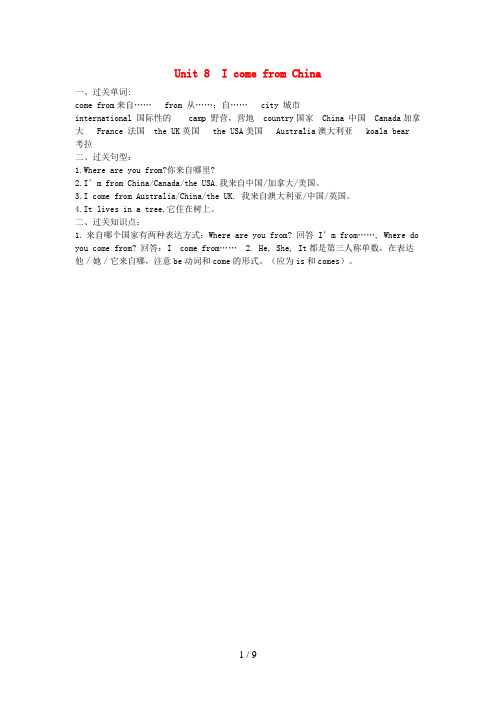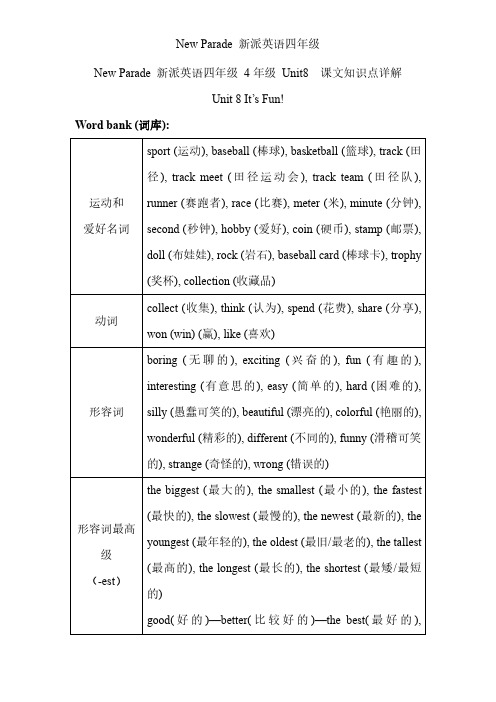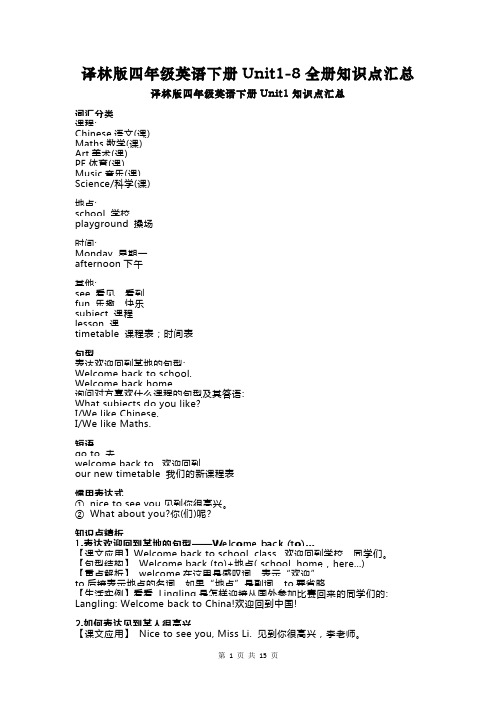四下Unit8知识点及基础练习
洮南市四小四年级英语下册 Unit 8 I come from China知识梳理 湘少版

Unit 8 I come from China一、过关单词:come from来自…… from 从……;自…… city 城市international 国际性的 camp 野营,营地 country国家 China 中国 Canada加拿大 France 法国 the UK英国 the USA美国 Australia澳大利亚 koala bear 考拉二、过关句型:1.Where are you from?你来自哪里?2.I’m from C hina/Canada/the USA.我来自中国/加拿大/美国。
3.I come from Australia/China/the UK. 我来自澳大利亚/中国/英国。
4.It lives in a tree.它住在树上。
二、过关知识点:1.来自哪个国家有两种表达方式:Where are you from? 回答I’m from……, Where do you come from? 回答:I come from……2. He, She, It都是第三人称单数,在表达他/她/它来自哪,注意be动词和come的形式。
(应为is和comes)。
教学计划一、指导思想:本学期我将继续全面贯彻党的教育方针政策,认真学习新课改的精神,以素质教育为根本宗旨,以培养创新精神和实践能力为重点,结合小学英语课程标准,采用“我本管理,先学后教,当堂训练”的教学模式,采用符合学生年龄、心理特征和语言规律的教学方法,培养学生学习英语的能力和自信心,打造高效英语课堂。
二、工作目标:通过本学期的教学达到如下目标:1、能听懂、会说12组会话,活用四会句型,进行简单的交流,做到大胆开口,发音正确。
2、能听、说、认读60个单词和词组并能听、说、读、写61个单词和24个句子(包括学校、时间、衣服、天气、购物、农场动物、数字、颜色等几个话题),并能简单运用。
3、能在图片、手势、情境等非语言提示的帮助下,听懂清晰的话语和录音。
苏教版新四年级重点小学英语下册4BUnit1-8知识点1-8习题

精心整理4年级下册Unit1一、选出不同类的单词.()A.ourB.myC.I 2.()A.youB.yourC.I.()A.weB.ourC.your 4.()A.classB.forC.to.()A.likeB.timeC.go 6.()A.newB.seeC.fun.翻译七门学科2.一门新的学科3.上一节美术/一节英语课少节数学课___________________5.今天上午/下午________________________么课__________________7.我们的学校课程8.我们的学校节英语课10.oyouhavethisterm、选择题。
t’stime_______—,playground,bjects,many,ree,I,this,,what,this,,how,is,booktime,go,it,for,is,bed(.)搭配题,选择相应的答句。
okatmyEnglishbook.IlikeEnglish. A.It’sinyourbedroom..Wouldyoulikeatimetable? B.I’dliketwoMathsbooks..CanIhelpyou? C.Metoo..Dad,where’smyfootball? D.Let’sgototheplayground..It’stimeforPE. E.Yes,please、用所给词的适当形式填空。
owmany(Mathslesson)dowehave?2.Ilike________.Doyoulikethis_______?(cake)ere_________(be)some_________(milk)intheglass.hat’s_________(I)timetable.5.It’stime___________(have)aPElesson.、句型转换kePEandMusic.(改为一般疑问句,并做肯定回答)kePEandMusic.(对句子划线部分提问)doyoulike?heyhaveChineseandSciencethisafternoon.(对句子划线部分提问)dotheyhavethisafternoon? likePEandMaths.(改为否定句)IPEandMaths.WehaveanArtlessonthismorning.(改为一般疑问句并作否定回答)youanArtlessonthismorning?No,. ehavesevensubjectsthisterm.(对划线部分提问)subjectshavethisterm?4年级下册Unit2一、选择。
四年级下册英语知识讲解及练习 Unit8 How are you知识讲解说课稿及巩固练习 译林版(附

四年级下册英语知识讲解及练习 Unit8 How are you知识讲解说课稿及巩固练习译林版(附答案)1. Unit8 How are you词汇讲解本单元主要以介绍和询问他人身体是否健康为主要话题。
以下是本单元涉及的词汇:•fine:身体良好,健康、好•not well:身体不舒服、不健康•stomachache:胃疼•headache:头疼•toothache:牙疼•sore throat:喉咙疼痛•fever:发烧•catch a cold:感冒2. Unit8 How are you句子讲解以下是本单元中常见的句子及其翻译:•A: How are you?•B: I’m fine, thank you.•A: 你怎么样?•B: 我很好,谢谢。
•A: How are you?•B: Not well, I have a stomachache.•A: 你怎么样?•B: 不太舒服,我胃疼。
•A: How are you feeling?•B: I have a headache.•A: 你感觉怎么样?•B: 我头疼。
•A: What’s wrong?•B: I have a sore throat.•A: 发生了什么事吗?•B: 我喉咙疼。
•A: Do you have a fever?•B: Yes, I have a fever.•A: 你有发烧吗?•B: 是的,我发烧了。
•A: What’s the matter?•B: I caught a cold.•A: 怎么了?•B: 我感冒了。
3. Unit8 How are you常用表达下面是本单元中常用的表达:•I’m sorry to hear that(听到这消息我感到很遗憾)。
•Take care of yourself(照顾好你自己)。
•Drink plenty of water(要多喝水)。
4. Unit8 How are you练习1. 选择填空1.How __________ are you? A. betterB. wellC. good2.A: What’s __________ with you?B: I have a toothache. A. happenB. matterC. wrong3.A: Do you have a __________? B: No,I don’t. A. feverB. headacheC. stomachache4.A: How are you feeling? B: __________, I have a sore throat. A. FineB. Not wellC. Good5.A: Can you go to school today? B: __________, I caught a cold. A. YesB. NoC. Maybe2. 句型转换1.How are you? (用“not well”回答)–Not well.2.Wh at’s wrong? (用“sore throat”回答)–I have a sore throat.3.I have a headache. (改为一般疑问句)–Do you have a headache?4.He caught a cold. (改为否定句)–He didn’t catch a cold.5.Let’s drink plenty of water. (改为祈使句)–Drink plenty of water.5. Unit8 How are you习题答案1. 选择填空1.B2.C3.C4.B5.B2. 句型转换1.Not well.2.I have a sore throat.3.Do you have a headache?4.He didn’t catch a cold.5.Drink plenty of water.。
四下 Unit 8 单元知识点整理

四下Unit 8 单元知识点整理
1.可以
2. 听到,听见
3. 保重
4. 在上学,在学校
1. 来学校
2. 感冒
3. 发烧
4. 我很好,谢谢。
5. 明天见。
6. 再见.
7. 咳嗽
8. 头疼,头痛
9. 不太好。
1. 听到那个
2. 保重
3. 在学校
1. 和李老师通话
2. 不能来
3. 来学校
4. 得了感冒
5. 得了感冒和发烧
6. 再见
7. 得了咳嗽8. 没有课
9. 去看看10. 严重的咳嗽11. 听到那个消息很抱歉12. 发烧
13. 头痛14. 吴医生
1. (电话用语) 我是杨玲。
2. (电话用语) 我可以和李老师通话吗?
3. 今天我不能到学校来了。
4. 我感冒并发烧了。
5. 听到这个消息我很难过。
6. 保重,杨玲。
7. 你现在好吗?
我很好,谢谢。
8. 不太好。
我咳嗽了。
9. 你明天能来学校吗?
10. 明天见。
再见。
11.波比在吗?
不在,他在学校。
12. 盒子里的热狗不是那只狐狸的午餐。
13. 那么,去看吴医生吧!
14. 放学后我能来看望你吗?
15. 一会见。
o / ɒ / coffee dog hot not sock box fox doctor tomorrow clock orange sorry long。
四年级下册英语知识讲解及练习 Unit8 How are you知识讲解教案及巩固练习 译林版(附答案)

Unit8 How are you?一.词汇预览1.may (情态动词)可以近义词can way路 say说May I sit here?=can I sit here?我可以做这里吗?2.cold感冒(n);寒冷的 I have a cold.我感冒了3.fever发烧(n) have a fever发烧 never从不4.hear 听到,听见 I can not hear it.5.cough咳嗽(n) have a cough咳嗽6.headache头疼(n)1.问身体状况:(1)How are you?你好吗?回答:I’m fine,Thank you/ Not so good/ Not bad(2)What’s the matter?或What’s wrong with …?回答用“I have a …”句型。
have 表示“患病,得病”,后面接疾病名称,而且前面通常加上a. 如,--What’s the matter with her? – She has a terrible headache.2. How are you?的用法。
(1)身体很好时,如:--How are you?--I’m fine, thank you. / I’m very well, thank you.(2)身体情况一般时,如:--How are you?--Not bad, thank you.(3)身体不太好时,如:--How are you?--Not so good. / Not very well.当你听到别人身体不太好时,应该表达以下同情,以示关心。
如:--How are you?--Not so good. I have a fever.--I’m sorry to hear that.3.打电话用语(1)打电话时先介绍自己:Hello. This is …speaking. 一般不用“I am …”句型。
[译林版]四下Unit8知识点及基础练习
![[译林版]四下Unit8知识点及基础练习](https://img.taocdn.com/s3/m/f9f66bcd7e21af45b207a853.png)
四下Unit8知识点汇总一、单词:may可以cold感冒fever发烧hear听到,听见cough咳嗽headache头疼1、时间类:today今天tomorrow明天Sunday周日Monday周一Tuesday周二Wednesday周三Thursday周四Friday周五Saturday周六morning早晨afternoon下午evening晚上2、称呼类:Mr先生Mrs夫人Miss小姐二、词组1、have a cold感冒12、see you tomorrow明天见23、go and see you tomorrow明天去见你2、have a cough 咳嗽13、see you next week下周见24、come to your home 去你家3、have a fever 发烧14、see you this afternoon今天下午见25、take the pills服药4、have a headache头疼15、don’t have any lessons没有课26、see you this evening今晚见5、have a high fever发高烧16、in the box在盒子里27、go and see a doctor去看医生6、have a bad cough咳嗽很严重17、for the fox给狐狸28、come to school来学校20、not at home不在家18、go to school去上学29、make a telephone call打电话8、take care保重19、have a cold too也感冒30、some illnesses一些疾病9、at school在上学,在学校20、see you soon回头见10、speak to 与......交谈21、see you later 待会见11、have lessons 有课22、come to see you来见你三、句型1、This is Miss Li speaking.我是李老师。
New Parade 新派英语四年级 4年级 Unit8 It’s Fun!课文知识点详解

New Parade新派英语四年级4年级Unit8课文知识点详解Unit8It’s Fun!Word bank(词库):运动和爱好名词sport(运动),baseball(棒球),basketball(篮球),track(田径),track meet(田径运动会),track team(田径队), runner(赛跑者),race(比赛),meter(米),minute(分钟), second(秒钟),hobby(爱好),coin(硬币),stamp(邮票), doll(布娃娃),rock(岩石),baseball card(棒球卡),trophy (奖杯),collection(收藏品)动词collect(收集),think(认为),spend(花费),share(分享), won(win)(赢),like(喜欢)形容词boring(无聊的),exciting(兴奋的),fun(有趣的), interesting(有意思的),easy(简单的),hard(困难的), silly(愚蠢可笑的),beautiful(漂亮的),colorful(艳丽的), wonderful(精彩的),different(不同的),funny(滑稽可笑的),strange(奇怪的),wrong(错误的)形容词最高级(-est)the biggest(最大的),the smallest(最小的),the fastest (最快的),the slowest(最慢的),the newest(最新的),the youngest(最年轻的),the oldest(最旧/最老的),the tallest (最高的),the longest(最长的),the shortest(最矮/最短的)good(好的)—better(比较好的)—the best(最好的),bad(差的)—worse(比较差的)—the worst(最差的), many(多的)—more(比较多的)—the most(最多的), beautiful(漂亮的)—more beautiful(比较漂亮的)—the most beautiful(最漂亮的),difficult(困难的)—more difficult(比较困难的)—the most difficult(最困难的)图片词coin(硬币),stamp(邮票),rock(岩石),baseball card (棒球卡),running shoe(跑鞋),trophy(奖杯),stopwatch(计时表),track shirt(田径运动服)Drills(句型):----It’s easy and fun to collect coins.(收集硬币既简单又有趣。
译林英语小学四年级的的下unit8知识点与练习.doc

个性化辅导教案课题(课型)Unit8 how are you教学目标或 1.unit8 知识点复习考点分析: 2.unit8 练习教学方法:知识梳理、例题讲解、归纳总结、巩固训练个性化辅导内容:Unit 8 How are you? 知识汇总一、语音o/ ? /coffee, dog, hot, not, sock, box, foxThe hot dog in the box is not lunch for the fox!二、词汇三会单词: cold 感冒fever 发烧cough 咳嗽headache 头疼,头痛come to school 来学校四会单词: may 可以hear 听到,听见 take care保重 at school 在学校词组:1. speak to Miss Li 和李老师通话2. come to school 来到学校3. have a cold感冒4. take care 保重5. See you tomorrow. 明天见。
6. I’m fine. 我很好。
7. at school 在学校8. Not so good. 不太好。
9. go and see 去看看10. a bad cough 严重的咳嗽11. See you. 再见12. have a fever 发烧三、句型1.This is Yang Ling speaking.(电话用语 ) 我是杨玲。
2.May I speak to Miss Li?(电话用语 ) 我可以和李老师通话吗?3.I can’tcome to school today. 今天我不能到学校来了。
4.I have a cold and a fever. 我感冒并发烧了。
5.I’m sorry to hear that. 听到这个消息我很难过。
6.Take care, Yang Ling. 保重,杨玲。
7.How are you now? I’m fine, thank you./Not so good. I have a cough.你现在好吗?我很好,谢谢。
译林版四年级英语下册Unit 1-Unit8知识点汇总

译林版四年级英语下册Unit 1知识点汇总单词school 学校subject 课程Welcome back to …欢迎回到……see 看见,看到timetable 课程表,时间表Chinese 语文(课) Maths 数学(课)Art 美术(课)PE 体育(课)Music 音乐(课)Science 科学(课)fun 乐趣,快乐go to 去……. playground 操场lesson 课Monday 星期一afternoon 下午重点内容词汇分类课程:Chinese语文(课) Maths数学(课) Art美术(课)PE体育(课) Music音乐(课) Science/科学(课) 地点:school 学校playground 操场时间:Monday 星期一afternoon下午其他:see 看见,看到fun 乐趣,快乐subject 课程lesson 课timetable 课程表;时间表句型表达欢迎回到某地的句型:Welcome back to school. Welcome back home.询问对方喜欢什么课程的句型及其答语: What subjects do you like?I/We like Chinese.I/We like Maths.短语go to 去…welcome back to…欢迎回到…our new timetable 我们的新课程表惯用表达式①nice to see you.见到你很高兴。
②What about you?你(们)呢?知识点精析1.表达欢迎回到某地的句型——Welcome back (to)…【课文应用】Welcome back to school, class. 欢迎回到学校,同学们。
【句型结构】Welcome back (to)+地点( school, home,here...)【重点解析】welcome在这里是感叹词,表示“欢迎”to后接表示地点的名词,如果“地点”是副词,to要省略。
期末刷高分:小学英语四下Unit 7-Unit8知识点讲解 练习(译林版三起)(word版,含答案)

2022-2023学年小学英语四下Unit7-Unit8知识点讲解+练习(译林版三起)Unit7 What’s the matter?【四会单词】bad 爸爸water 水ill 生病tired 累的,疲劳的happy 快乐的,高兴的speak 说话,讲话Mrs 夫人,太太【词组短语】e and have a pie来吃馅饼2.good night晚安3.here’s some water这里有些水4.have a cake吃蛋糕5.have some water喝些水6.all right 好的7.want to go to bed 想要睡觉8.Good night.晚安。
9.take this pill吃这片药10.my baby我的宝贝【句型】1. What’s the matter? 怎么了?2. I’m not hungry, I’m thirsty. 我不饿,我渴。
3. Can I have some water? 我可以喝些水吗?4. Here you are. 给你。
5. Come and have a pie, Taotao. 过来吃个派,涛涛。
6. I want to go to bed. 我想要睡觉。
7. Good night, dear. 晚安,亲爱的。
8. Are you ill? 你病了吗?No, but I’m tired. 不,但我累了。
9. Here is some water for you. 这儿有些水给你。
10. Are you cold? 你冷吗?No, I ’m not. / Yes, I am.11. This is Mrs Fox speaking. 我是狐狸夫人。
(打电话用语)12. Are you all right, Bobby? 波比,你还好吗?13. Have some water, Wang Bing. 王兵,喝一些水。
14. Here’s a hot dog. 这儿有个热狗。
精品译林版四年级英语下册Unit8 How are you 重点语法、 基础知识整理

四年级英语(下册)重点语法、基础知识整理4B Unit 8 How are you ?Words :1.患……病:主语+ have / has + a/an + 某种疾病某种疾病:cold 感冒fever 发烧cough 咳嗽headache 头痛,头疼toothache 牙疼短语:have a cold 感冒have a cough 咳嗽have a fever 发烧have a headache 头疼have a toothache 牙疼例句:①—你怎么了?—What’s the matter with you ?—我病了。
我感冒了。
—I _____ _____ . I ______ _______ _______ .②—我发烧了。
—I ______ _______ ________ .例题:①()Liu Tao has a had ______ , so he is at home .A . dinnerB . coldC . hot②今天我有点咳嗽。
I ______ ______ _______ today .③我头疼。
_______ _______ _______ _________ .④那个女孩咳嗽的厉害。
That girl ______ _______ ________ _________ .⑤选出与其余单词不同类的选项。
()A. cough B . headache C . ill2.may /mei/ (情态动词) 可以may + 动词原形改为一般疑问句时,把may提前;做否定句时,在may后面+not ;用法同can 、be动词例句:—我可以进来吗?—可以。
请进。
—May I come in ? —Yes . Come in , please .例题:连词成句。
I , have , may , water , some (?) ____________________________3.come to school (动词短语)到学校→近义短语:go to school 去上学例句:—你什么到学校?—When do you come to school ?—我在八点钟到校。
小学英语四年级下册Unit 8

What are you doing?
I’m taking exercises .
What are you doing?
I’m watching TV.
What are you doing?
I’m flying a kite.
What are you doing?
I’m fishing in the park.
Unit8 What are you doing?
本课重点句子
What are you doing? 现在进行时句子结构: 主语 + be 你在做什么?
ห้องสมุดไป่ตู้am
are is
注:英语中有两类动词,一类是与动作有关的词, 还有一类就是be动词。 熟记:am、is、are后的动词要加ing形式 思考:1.主语,即人称,有几种? 2.不同的人称对应的be动词是不是也不同?
3.What is he doing?
He is
fishing in the park. 他在公园钓鱼。
3.What is he doing?
He is
taking photos. 他在拍照。
Practice
1.在客厅看卡通片
Practice
2.在操场放风筝
Practice
3.在客厅唱歌和跳舞
2.What is she doing?
She is
singing and dancing. 她在唱歌和跳舞。
2.What is she doing?
She is
flying a kite. 她在放风筝。
2.What is she doing?
She is
listening to music. 她在听音乐。
沪教版英语四年级下册第八单元讲解

一、重点单词“四会”单词:Monday , Tuesday, Wednesday, Thursday, Friday, Saturday, Sunday, with ,game, clock“三会”单词:week,weekend, play chess, play games, at the weekend, (be)late for,after school.二、重点句子1、Peter likes reading. He goes to the school library on Monday afternoon.2、At the weekend ,Peter goes to the park with his family.3、Tom runs out . He doesn’t have breakfast.4、Tom is not late for school.5、Tom likes reading in the evening.三、基础知识大考察:1. The first day of one week is ___________________.2. The last day of one week is __________________.3. Once a week means _____________________.4.在周一的下午:_____________________________.5.在周五的傍晚:________________________________.6.从周一到周五:________________________________.7. 在周末:___________________________________.8. 在周六:______________________________.四、课文回顾Peter __________ reading. He _________ goes to the school library ____ Monday afternoon. Peter likes___________ basketball too. He plays basketball ________ his friends on Tuesday afternoon. On Wednesday ______ Thursday, Peter plays ______chess after school. On Friday evening, Peter plays games at home. _______ the weekend, Peter goes to the park with his family.五、课后拓展:按要求写出下面单词春夏秋冬:___________;__________;___________;___________一月到十二月:___________;___________;___________;___________;___________;___________;___________;___________;____________;___________;____________;___________.Step 4 Practice一、中译英1.去学校图书馆2.在家玩游戏3.迟到4.下象棋5.放学6.去公园7.八点半8. 精疲力竭二、写出下列动词的三单形式1. go2. do3. play4.like5.are6.have7.fly 8. fix9.study 10.teach11.wash 12.brush1. The sun rises_________ the morning.2. We have an English lesson _________ Tuesday.3. Mike plays table tennis _________ Monday morning.4. I usually play chess_______ my grandpa.5. Let’s go shopping _________ school.6. The teacher go to school _______ a quarter ________ eight.四、用括号里所给词的适当形式填空1. He often ________(have) dinner at home.2. Amy __________( not go ) to the school today.3. The man__________(teach) us English.4. Tom’s mother _________(like) cooking.5. Does she _______(like) writing?6._________ your brother study English at school? Yes, he________(do)7. He ________(brush) his teeth twice a day.8. She ________(wash) dishes once a week.9. Mary just _______(have) two meals a day.10. His grandpa often __________(read) newspapers after dinner.Step 5 Summary课堂测评一、单项选择1.What day is it ,today?--It’s ________.A. JuneB. March 4thC. Friday2. What time is it?--It’s ________.A. ten past sevenB. MarchC. Monday3. What’s the date , today?--It’s ________.A. six o’clockB. May 3rdC. Monday4. Let’s go to KK mall _______ Sunday evening.A. onB. inC. at5.________ summer , I like swimming best.A. AtB. OnC. In6.The day before Tuesday is _________.A. ThursdayB. WednesdayC. Monday7. What _______ you usually do on Sunday?---I usually clean my room by myself.A. areB. doC. did8.MoMo often plays _______ basketball on Friday afternoon and plays________ piano on Sunday evening.A. the;/B./;theC./;/9. The third day of one week is __________.A. WednesdayB. TuesdayC. Monday10.The sixth month of one year is ___________.A. JulyB. JuneC. August二、阅读理解(1) An Old Woman and a BoyAn old woman wants to go to New York to see her son. She gets upearly and gets to the station at nine o’clock in the morning .When doesthe train come and leave? She is very worried. She stops a boy and askshim.The boy looks at the woman and says,”tu: tu: tu: ”. The old womansits in a chair and thinks and thinks. Then she says,”Oh, I see.”快速判断:1. The woman is young. ( )2. The boy does not tell her the time. ( )3. The woman gets up early. ( )4. The train comes in the afternoon. ( )选择填空:1. The woman gets to the station at in the morning.2. The train comes at in the afternoon.A: 1:58 B: 9:00 C: 2:02(2) A Foolish DogA dog has large piece of meat in his mouth. When he is walking on a small bridge, he looks down and sees himself in the water. He thinks it is another dog. That dog has also a large piece of meat in his mouth. He says to himself ,”I want to get his meat. Then I can have two pieces of meat.” He opens his mouth to bark the dog in the water , and his meat falls into water.词海导航meat 肉 walk 走 bark 吠声 fall 落下 bridge 桥快速判断:1.The dog has a small piece of meat. ( )2.He wants to get two pieces of meat. ( )3.He finds another dog in the water. ( )4.The dog is standing on the grass. ( )5.He has no meat at last. ( )Step6 Homework一.选择填空。
译林版四年级英语下册Unit1-8全册知识点汇总

译林版四年级英语下册Unit1-8全册知识点汇总译林版四年级英语下册Unit1知识点汇总词汇分类课程:Chinese语文(课)Maths数学(课)Art美术(课)PE体育(课)Music音乐(课)Science/科学(课)地点:school 学校playground 操场时间:Monday 星期一afternoon下午其他:see 看见,看到fun 乐趣,快乐subject 课程lesson 课timetable 课程表;时间表句型表达欢迎回到某地的句型:Welcome back to school.Welcome back home.询问对方喜欢什么课程的句型及其答语:What subjects do you like?I/We like Chinese.I/We like Maths.短语go to 去…welcome back to…欢迎回到…our new timetable 我们的新课程表惯用表达式①nice to see you.见到你很高兴。
②What about you?你(们)呢?知识点精析1.表达欢迎回到某地的句型——Welcome back (to)…【课文应用】Welcome back to school, class. 欢迎回到学校,同学们。
【句型结构】Welcome back (to)+地点( school, home,here...)【重点解析】welcome在这里是感叹词,表示“欢迎”to后接表示地点的名词,如果“地点”是副词,to要省略。
【生活实例】看看Lingling是怎样迎接从国外参加比赛回来的同学们的: Langling: Welcome back to China!欢迎回到中国!2.如何表达见到某人很高兴【课文应用】Nice to see you, Miss Li. 见到你很高兴,李老师。
Nice to see you too. 见到你们也很高兴。
“Nice to see you”意为“见到你(们)很高兴”,它的答语可以为“Nice to see you too.例如:一Nice to see you here,Miss Zhao. 在这里见到你很高兴,赵老师。
- 1、下载文档前请自行甄别文档内容的完整性,平台不提供额外的编辑、内容补充、找答案等附加服务。
- 2、"仅部分预览"的文档,不可在线预览部分如存在完整性等问题,可反馈申请退款(可完整预览的文档不适用该条件!)。
- 3、如文档侵犯您的权益,请联系客服反馈,我们会尽快为您处理(人工客服工作时间:9:00-18:30)。
四下Unit8知识点汇总一、单词:may可以cold感冒fever发烧hear听到,听见cough咳嗽headache头疼1、时间类:today今天tomorrow明天Sunday周日Monday周一Tuesday周二Wednesday周三Thursday周四Friday周五Saturday周六morning早晨afternoon下午evening晚上2、称呼类:Mr先生Mrs夫人Miss小姐二、词组1、have a cold感冒12、see you tomorrow明天见23、go and see you tomorrow明天去见你2、have a cough 咳嗽13、see you next week下周见24、come to your home 去你家3、have a fever 发烧14、see you this afternoon今天下午见25、take the pills服药4、have a headache头疼15、don’t have any lessons没有课26、see you this evening今晚见5、have a high fever发高烧16、in the box在盒子里27、go and see a doctor去看医生6、have a bad cough咳嗽很严重17、for the fox给狐狸28、come to school来学校20、not at home不在家18、go to school去上学29、make a telephone call打电话8、take care保重19、have a cold too也感冒30、some illnesses一些疾病9、at school在上学,在学校20、see you soon回头见10、speak to 与......交谈21、see you later 待会见11、have lessons 有课22、come to see you来见你三、句型1、This is Miss Li speaking.我是李老师。
2、May I speak to Yang Ling?我能和杨玲交谈吗?3、I can’t come to school today.我今天不能来学校了。
4、I’m sorry to hear that.听到这个消息我很难过。
5、How are you now?你现在好吗?6、I’m fine,thank you .我很好,谢谢你。
7、Not so good.不太好。
8、I have a cold/cough/fever/headache.我感冒/咳嗽/发烧/头疼。
9、She/He has a cold/cough/fever/headache. 她/他感冒/咳嗽/发烧/头疼。
10、We don’t have any lessons on Sunday. 我们在周日没有课。
11.Can I come to see you after school? 放学后,我能去看你吗?12.Is Bobby there?波比在那儿吗?13.No.He’s at school.不。
他在学校。
14.I have a cough and a headache.我咳嗽并且头疼。
15.What’s the matter with Yang Ling?杨玲怎么了?16.Mike has a bad cough.迈克咳嗽很严重。
四、语音O/ɔ/ coffee dog hot not sockThe hot dog in the boxIs not lunch for the fox.例词:box long orange sorryclock on4B Unit 8练一练一、判断下列各组单词划线部分发音是否相同,相同的写S,不同的写D。
( ) 1. not go ( ) 2. hot coffee ( ) 3. home fox ( ) 4. dog nose ( ) 5. no open二、英汉互译1.你好吗?2.来学校3.得了个头疼病4.保重5.明天见。
6. make a telephone call7.不太好。
8.我很好。
e to school 10.在星期天三、单项选择( )1. Hello,_______I speak to Helen?A. doB. m ayC. am( )2. —I feel________. —Here’s a sofa for you.A. thirstyB. hungryC. tired( )3. —I have a bad cough. —___________A. I’m sorry to hear that.B. Sorry.C. How are you?( )4. —How are you, Sam?—___________A. I’m two.B. I’m fine, thank you.C. I’m cold.( ) 5. —I’m hot.—Here’s _________ for you,A. an umbrellaB. a fanC. a chair( ) 6. —What’s the matter with Tim?—He a fever.A. haveB. hasC. haves( ) 7. Here _____ some water.A. isB. areC. /( ) 8. —I can’t play football.—Don’t be _____ . Have a try.A. happyB. tiredC. sad( ) 9. —How old is your sister?—______________A. She’s fifteen.B. Fine, thank you.C. He’s eleven.( ) 10. —Hello, this is Bobby speaking.—Hello, _______ Sam.A. I amB. /C. this is四、用所给词的适当形式填空1.Hello! This is Helen (speak) . May I (speak) to Mike?2.Can you (come) to school today?3. Yang (have) a cold and a fever.4. How (be) your sister? She’s fine.5. How (be) you? Not so good.6. Hello! This is Helen ______(speak)7. Yang Ling _______(have) a big bag.8. Can you ______(see) that boy?9. The jeans ______(be) my brother’s.10. How ______(be) your father?11. I want ______(drink) some water.12. I can see some ______(flower) over there.13. Here’s some ______(milk).14. Let ______(I) have a look.五、改错(T)( ) 1. I’m sorry for hear that.A B C( ) 2. This is Miss Gao speak.A B C( ) 3. Is you thirsty?A B C( ) 4. I want go to bed.A B C( ) 5. Here are some juice.A B C六、根据上下文完成对话.A: Hello, may I __________ to Mr Green?B: Hello, _________ is Mr Green _____________.A: Hello, Mr Green. I _________ come to school today. B: _________ the __________?A: I have a _________ and a ____________. (咳嗽头疼) A: I’m __________ to hear that. Take .B: Thank you, Mr Green.七、根据上下文完成对话.A: Hello, may I __________ to Mr Green?B: Hello, _________ is Mr Green _____________.A: Hello, Mr Green. I _________ come to school today. B: _________ the __________?A: I have a _________ and a ____________. (感冒头疼) A: I’m __________ to hear that. Take care.B: Thank you, Mr Green.八、把下列句子排列成一段通顺的对话。
1.What’s the matter?2.Hello, Mike. This is Su Yang speaking. How are you?3.I’m sorry to hear that.4.Not so good.5.I have a cold and a fever.6.Hello! This is Mike speaking1。
